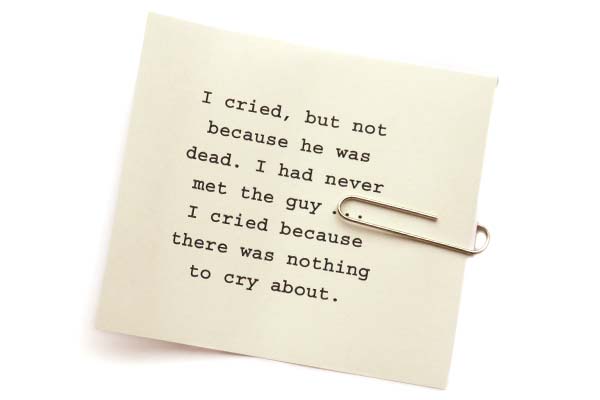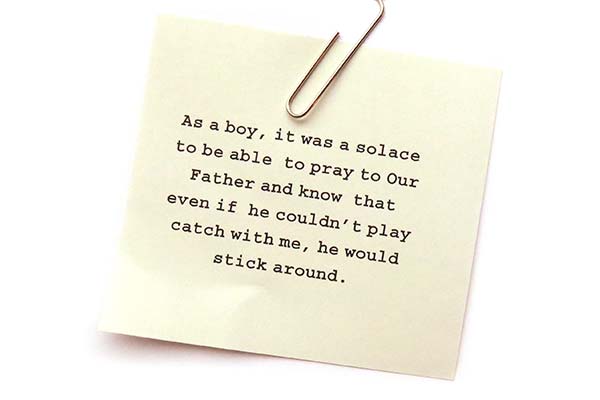Subtotal: $
Checkout-

Decoding the Bible’s Begats
-

The Name of My Forty-Sixth-Great-Grandfather
-

Somewhere in Chessington
-

Singing the Law
-

Desiring Silence
-

Uncle Albert
-

Soldier of Peace
-

The Chocolate Ice Cream
-

Poem: “The Revenant”
-

Poem: “L’esthétique de la Ville”
-

Poem: “When You Pursue Me, World”
-

Gazapillo
-

Editors’ Picks: God Loves the Autistic Mind
-

Editors’ Picks: Damnation Spring
-

Editors’ Picks: Life between the Tides
-

The Faces of Our Sons
-

Remembering Tom Cornell
-

Letters from Readers
-

Monica of Thagaste, Mother of Augustine
-

Covering the Cover: Generations
-

A Legacy of Survival
-

Daughter of Forgottonia
-

Giving Your Children Your Words
-

Book Tour: On Being a Good Ancestor
-

Ten Theses on Intergenerational Stewardship
-

Inheriting Mental Illness
-

Yearning for Roots
-

Fear of a Human Planet
-

Reviving the Village
-

Is There a Right to Have Children?
-

The Stranger in My House
-

The Sins of the Fathers

My Father Left Me Paperclip
What kind of inheritance can an illegitimate son expect?
By Terence Sweeney
December 6, 2022
Available languages: Español
Next Article:
Explore Other Articles:
I have it on my desk right now. I tied a yellow ribbon around it. Not for any symbolic reason, just to make sure I don’t lose it or mix it up with the other paperclips on my desk. I first learned of this inheritance on a train platform in West Philly after getting off the Market-Frankford Line and waiting for the Norristown train. I was on the way to teach. My mother called to say, “Your father died.” His lawyers had reached out to her because they needed to contact his surviving children. Since I am still alive – along with my siblings – the lawyers needed to contact me about the paperclip (although I didn’t know about the paperclip yet and neither did they).
We spoke briefly. I asked how she was feeling. She said she wasn’t surprised; he was older; she just hoped her children got what they deserved (definitely not thinking of the paperclip). I asked about his name again. I couldn’t remember, and checking my own last name doesn’t help. My mother’s maiden name is my last name, which makes my passwords both less secure (if you know my name, you know her name) and more secure (wouldn’t Sweeney be the last name you’d pick?). When people ask about my mother’s maiden name, I feel awkward. Once as a child I lied and told someone she happened to have the same last name as my father but they weren’t cousins. Or I would tell people she wanted to keep her last name and pass it down to us. There is some truth to that.
We got off the phone. I cried, but not because he was dead. I had never met the guy. How do you cry for an absence? For something that isn’t there, a gap in the fabric of a family. I cried because there was nothing to cry about. I should have been weeping for other reasons, but I had no other reasons. I boarded the train with people looking at me askance. I went and tearlessly taught my classes. You can’t skip class for a man you have never met.
After that, there was not much news. I called my brother and sister. I talked with my mother, who insisted again that I deserved an inheritance. I looked him up and it did seem that he had been well off: a bank executive with enough clout to serve on the board of a university. My wife and I, who are not so well off, talked about whether I wanted an inheritance. Getting some money would help an artist (her) and a philosopher (me). With an inheritance, we could afford one of the houses in West Philly with a nice porch and tulips. We could have one of those big bay windows and put a lawn sign up about how we believe in science and that love is love.

At the same time, it would feel weird getting money from a stranger. What would one inherit from a void? He didn’t know me, and an inheritance didn’t seem like something you would leave to a kid you don’t know or, worse, to a kid you vaguely recall as your bastard. A not very charming word. Microsoft Word warns me that this language may be offensive to you, my reader. So I really have no excuse. But it is the right word; it is my word. To be a bastard is to be a person without a birthright and with only half of a family background. Ask me about my paternal uncles or my grandfather on my father’s side and I have nothing. A blank on the family tree. I could do some sleuthing, but the fact that I would have to do so is, well, sad. There is no received legacy to pass down. There is no inheritance.
A month went by and then the first letter arrived in the mail. It was a simple legal notice from a law firm on Long Island. They wanted me to verify my address so they could send me further material in the mail. The first letter let me know to wait for the second letter in the mail. I waited.
While I waited, I wondered what would arrive. Perhaps, amid the legal documents, a letter or a photo. I felt the hairs on my neck tingle like I had as a kid on long walks to the lake. Back then, I was sure that the car slowing down would be his. He would hop out and ask me where the Sweeneys lived. For some reason, he was driving with a baseball glove on. Imprudently, I would tell him the way. Returning home, I would find his car in the driveway and casually introduce myself as one of those Sweeneys. He would toss me a glove and suddenly we were having a catch in the yard between the lilac bushes and the broken-down Volkswagen Rabbit. Miraculously, I could catch and throw! He mussed my hair and then headed out.

Photograph by Bart Sadowski. Used by permission.
When the legal package arrived, there was no letter. Just like back then, I found myself at home and still bad at baseball.
The package consisted of a thick manila envelope containing three clusters of paper, each stapled together. Having determined that there was no letter from him to me, I went through the materials. There was in fact a lot of money properly doled out to the “issue of his marriage to ___.” The expression came up on page after page, just in case the question was unclear. I was not to receive the inheritance designated for his legitimate issue, the half-siblings I had never met. The only place I was mentioned by name was in another packet indicating how I could seek legal recourse for, well, being the wrong kind of issue. When drawing up his will, the man had not forgotten me. A man I couldn’t remember and so couldn’t forget had remembered me well enough to write me out of his inheritance.
I was reminded of this at Mass recently listening to Saint Paul: “if children, then heirs” (Rom. 8:14–17). But some of us are children and not heirs. Some of us had a father without ever having a dad. Yet here Paul is speaking of a deeper sonship, one that includes even us bastards:
All who are led by the Spirit of God are children of God. … When we cry, “Abba! Father!” it is that very Spirit bearing witness with our spirit that we are children of God, and if children, then heirs, heirs of God and joint heirs with Christ.
I felt that as a child. I found real solace as a kid saying the Our Father. It wasn’t the same as saying “my dad,” but the universal compensated for the lack of the intimate. Fatherless, I still got to have a Father.

Christianity is a religion for the illegitimate. As Rev. Will Campbell puts it, “We’re all bastards, but God loves us anyway.” None of us are children of God in any legitimate sense; we are made legitimate by adoption. What’s more, we’re grafted onto a family centered on a man who was born to a not-yet-wed mother and didn’t get to spend too much of his time on earth with his (real) Father. We may get disinherited in this life, but we’re adopted by the Father no matter what our status.
As a boy, it was a solace to be able to pray to Our Father and know that even if he couldn’t play catch with me, he would stick around. With my own father dead, this prayer gives a bit of solace and connection even now. From the obituaries I learned that Catholicism is something I shared with my father. When I prayed the Our Father, I now know, he too may well have been praying the Our Father. A tenuous connection but more real than any in my fatherless youth.
I set the packet down on my desk and heard the light tap of metal on wood. A stack of legal documents held together by a paperclip. Nothing to hold on to, nothing to pass on. I took the paperclip off and dropped the will in the trashcan. I held the clip in my hand. A paperclip, well cared for, could last a long time. My father had paid the law office for the work, the documentation, and all the material that went into making sure I did not receive anything. The paperclip was an ironic consolation; he had left me something after all. I was to receive no inheritance, but my father left me a paperclip. Not much, but not nothing. I showed my wife; she held my hand. I tied a yellow ribbon around the clip and slipped it into my desk drawer.

Where my father had been there was only absence, a space that was barely there. In the rich tapestry of love that my family had woven around me, he punctured a whole. My whole life I had kept vigil for when he would step into a space that I had kept open. He died and left that space as empty as ever. I did not get money from his dying, but I got a reminder: I pray to a Father who has promised, through his Son, to never disinherit any of his children. Perhaps, because of this Father’s mercy, I’ll meet my father someday. Maybe he’ll teach me to play baseball. But in the meantime, I still need something to hold on to from the dad I never had. I have tried to live with absence my whole life, but you can’t live with absence. I have always needed something to hold on to. I have my paperclip now; I can live with that.
Already a subscriber? Sign in
Try 3 months of unlimited access. Start your FREE TRIAL today. Cancel anytime.












































Julie
Wow. So beautifully written and resonates deeply.
Nancy Thompson
Terence Sweeney’s poignant article about his illegitimacy resonated deeply with my own experience. I was born in a hippy commune in rural Norfolk, in an era of flower children. My father spent just three months with my mum, before walking out on her. He went on to marry and have four more children, all of whom he sees, but not me. He has never met my sons, the eldest of whom looks very like him. Like Sweeney, I used to fantasise about having a dad who would push me on the swing or pick me up from the park or put me on his shoulders. As a child I wrote him countless letters, but he never replied. My sons used to ask me why my dad ran away. They will never know him. It was and is heartbreaking. I too am a practising Catholic, and when I read the same reading Sweeney referred to in his article (Rom 8:14 -17) at Mass the other week, I was struck by its pertinence to my status as bastard or illegitimate child. I had to take a breath so that I didn’t cry when I read the words “if children, then heirs". In many ways I admire the courage of the hippy generation in challenging the emotional repression many of them grew up with, as well as the material consumerism of the time. But was their notion of free love in fact free sex? Whom did it benefit and who got left holding the babies? Was their idea of feminism in reality simply single motherhood? I suspect that when my father dies, I will not even get a paperclip or any legal documents to say he has left me nothing. My heart goes out to Terence Sweeney and all other fellow bastards whose dads have rejected them. A fellow Christian once sent me a text message to tell me that I was God’s "precious daughter.” Tears poured down my face when I read it. I hope and pray that all those rejected by their earthly fathers can take comfort from knowing that our Father in heaven cherishes us and that we are all 'His precious children.’
Melanie Hohman
The father deficit is endemic. Thank you for affirming the likely outcome of my father's estate as this article will be remembered to make it sting less.
Stephen R. Clark
This article touched a nerve. My reaction is complicated. My son and I are estranged. Not my choice. His mother and I divorced decades ago when he was around 6. I moved away for a job but tried to stay in touch with letters, calls, gifts, visits. She and her family were very effective at blocking and rebuffing my efforts. The story he has heard about me, from bits and pieces I’ve gleaned over the years, is nowhere near accurate. So, who I am and who I am to him are parted by a gaping gulf of misrepresentation and forced absence. I saw him at his high school graduation and then, briefly, a couple of years later. Since then he’s married and has three kids. I’ve not met my daughter-in-law or my grandchildren. When his first child was born, my wife and I visited the town where he lives. We tried to see him and meet his family and deliver a baby gift. Again, we were rebuffed, warned in no uncertain terms to stay away, and then he severed all communication. On holidays and special occasions I text him, but he never responds. I’ve tried sending cards and letters but am not sure of his current address. Every day I wonder why my son so adamantly ignores me, is so ferocious in his withholding of himself. Knowing his mother’s personality quirks, I have an inkling, but nothing really definitive. I may never know. I’m sad for Terence and what he endured and endures. I’m sad for all the fathers and sons who keep themselves from each other. I pray reconciliation and healing for us all.
Delores Douglas
There are those of us who can relate to this void in life. Thank you for sharing your story and reminding me that we have a Father who revealed his love with an everlasting inheritance. I pray others receive the same comfort as I have by reading your words.
Prof JP Richards
Thank you for this thoughtful and kind essay. I too never met the man who shared his genetic inheritance with me and lives in my children and grandchildren, all prematurely grey haired. A wise friend commented after we had sat together for a morning workshop: "I have never sat next to so much suppressed anger." I was in my early 30s. The next hour was spent cursing my father for all that mum and I had endured. I had had no idea it was there. I was calmer after that hour.
Edward Hamilton
"he punctured a whole" I'm curious whether this was accidental or intentional. It's an interesting image.
Nancy Brewka-Clark
Thank you for telling this story with such courage, and intimacy, and grace. The solace of knowing ultimate love has given you the courage to be the fine human being you are, as well as an extraordinary writer.
Barbara Lundberg
Terence, thank you for sharing your amazing, beautiful story Tom Springer, thank you for sharing your perfect comment ❤️
Heidi Hooper
What a wonderful commentary on what it means to be Heirs of the one true father. Thank you so much for sharing so intimately your experience. Heidi in Atlanta
Tom Springer
Man, Terence, what a son your father had in you. How much richer, in true wealth, would he have been with you in his life. The great mercy you’ve shown him, as with all God’s mercy towards us, he does not deserve. But your father knows all now, and your next (and first) meeting with him will be more beautiful than anyone could imagine. Thanks for the beautiful tribute — oh, and the spare description of a big house with tulips in an academic neighborhood with a we believe in love and science sign out front? That was hilariously accurate.